|
MEMS Optical (Infrared) Gas Sensor How the MEMS IR Gas SensorChipTM works The SensorChip is a wavelength-tuned, MEMS-based micro-bridge element.
Using photonic bandgap (PBG) technology, the micro-bridge emits and absorbs
efficiently in a narrow waveband centered on the signature wavelength of
the target gas. Ion Optics tunes the infrared wavelength (like an LED)
during production using standard, stable semiconductor manufacturing techniques.
|
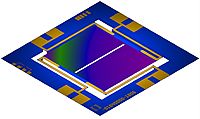
Ion Optics SensorChip |
|
How a conventional infrared gas sensor works |
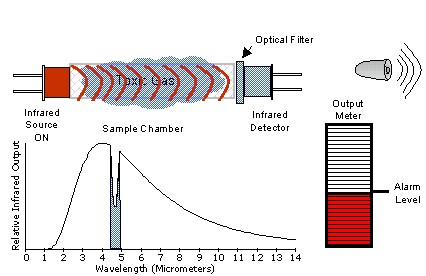
Conventional IR Detection |
|
CO2 Analyzers with Oxygen, Pressure, Temperature & Humidity Sensors Range CO2 low range: 0-10,000 ppm CO2 high range: 0-60% CO: 0-500 ppm Oxygen: 0-30% Barometric Pressure: 21 to 36" Hg Temperature: 0-104°F Humidity: 0-99.9% RH Others from same company |
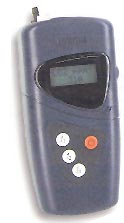 |
|
Safegard Carbon Dioxide Analyzer Poprtable Infrared detection of CO2 Range 0-5% CO2 Resolution 0.01% (100 ppm) CO2 Operating Temperature 4°F to 122°F Relative Humidity 0 to 99% Dimensions 5.5"H x 2.5"W |
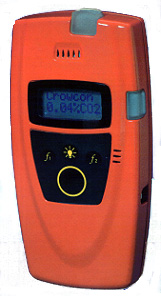 |
|
Model E12-41 Carbon Dioxide Transmitter from Analytical Technology Sensor Type Non dispersive infrared (NDIR) Range 0-2,000 ppm, 0-3,000 ppm or 0-5,000 ppm, 0-1%, 0-3%, 0-10%, 0-30% or 0-100% Output 0-20 or 4-20 mA, 500 ohms maximum Power 24 VDC, 300 mA maximum Temperature Limits 0-45°C |
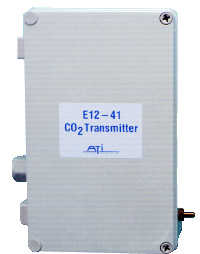 |
|
"Intelligent CO2 gas microsensors and PC based signal evaluation" Design of CO2 sensitive micro gas sensors: Transducer design, encapsulation and temperature modulated operation modes
|
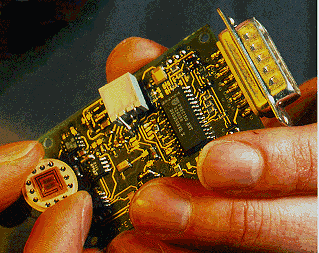 |
|
Keat G. Ong and Craig A. Grimes (Sensors 2001) Abstract: A carbon dioxide (CO2) sensor is fabricated by depositing a thin layer of a multi-wall carbon nanotube (MWNT) – silicon dioxide (SiO2) composite upon a planar inductor-capacitor resonant circuit. By tracking the resonant frequency of the sensor the complex permittivity of the coating material can be determined. It is shown that the permittivity of MWNTs changes linearly in response to CO2 concentration, enabling monitoring of ambient CO2 levels. The passive sensor is remotely monitored with a loop antenna, enabling measurements from within opaque, sealed containers. Experimental results show the response of the sensor is linear, reversible with no hysteresis between increasing and decreasing CO2 concentrations, and with a response time of approximately 45 s. An array of three such sensors, comprised of an uncoated, SiO2 coated, and a MWNT-SiO2 coated sensors is used to self-calibrate the measurement for operation in a variable humidity and temperature environment. Using the sensor array CO2 levels can be measured in a variable humidity and temperature environment to a ± 3% accuracy. |
 |